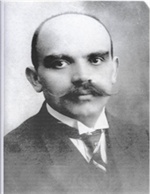
Józef Rymer
Encyclopedia

Poland
Poland , officially the Republic of Poland , is a country in Central Europe bordered by Germany to the west; the Czech Republic and Slovakia to the south; Ukraine, Belarus and Lithuania to the east; and the Baltic Sea and Kaliningrad Oblast, a Russian exclave, to the north...
and Silesia
Silesia
Silesia is a historical region of Central Europe located mostly in Poland, with smaller parts also in the Czech Republic, and Germany.Silesia is rich in mineral and natural resources, and includes several important industrial areas. Silesia's largest city and historical capital is Wrocław...
n activist and politician
Politician
A politician, political leader, or political figure is an individual who is involved in influencing public policy and decision making...
.
Born in Zabełków on February 2, 1882. Before the First World War he was an activist in the Zjednoczenie Zawodowe Polskie (Polish Union of Unions), a Polish labor union organization in Imperial Germany (see also German partition). He was also a member of the Naczelna Rada Ludowa (pro-endecja
Endecja
National Democracy was a Polish right-wing nationalist political movement active from the latter 19th century to the end of the Second Polish Republic in 1939. A founder and principal ideologue was Roman Dmowski...
) Polish political organization in Germany. He was the target of assaults and even an assassination by nationalist German extremists (Freikorps
Freikorps
Freikorps are German volunteer military or paramilitary units. The term was originally applied to voluntary armies formed in German lands from the middle of the 18th century onwards. Between World War I and World War II the term was also used for the paramilitary organizations that arose during...
); eventually he became one of the leaders of the Silesian Uprisings
Silesian Uprisings
The Silesian Uprisings were a series of three armed uprisings of the Poles and Polish Silesians of Upper Silesia, from 1919–1921, against German rule; the resistance hoped to break away from Germany in order to join the Second Polish Republic, which had been established in the wake of World War I...
. Elected to Polish parliament (Sejm
Sejm
The Sejm is the lower house of the Polish parliament. The Sejm is made up of 460 deputies, or Poseł in Polish . It is elected by universal ballot and is presided over by a speaker called the Marshal of the Sejm ....
) he also became the first voivode of the Silesian Voivodeship in June 1922. In December that year (on the fifth) he died of a stroke
Stroke
A stroke, previously known medically as a cerebrovascular accident , is the rapidly developing loss of brain function due to disturbance in the blood supply to the brain. This can be due to ischemia caused by blockage , or a hemorrhage...
and was buried at Francuska Street Cemetery in Katowice
Katowice
Katowice is a city in Silesia in southern Poland, on the Kłodnica and Rawa rivers . Katowice is located in the Silesian Highlands, about north of the Silesian Beskids and about southeast of the Sudetes Mountains.It is the central district of the Upper Silesian Metropolis, with a population of 2...
.

